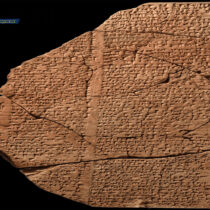To whom may a visitor – Greek or foreigner – who wishes to be guided by a qualified expert in a place of archaeological or historical interest address to? How much does a guided tour cost? Are there non-qualified guides and what should someone keep in mind, when guided by a professionally qualified tourist guide? We have addressed to the Panhellenic Federation of Tourist Guides to answer to the above and to other questions, in order to inform everybody who wants to be guided in places of archaeological and historical interest in Greece within the professional regulations for guiding.
To whom may the visitors of our country (Greek or foreigners) address to, in order to be guided in a place of archaeological or historical interest?
Visitors (Greeks or foreigners) who are interested to be guided by a professional expert in any place, like archaeological sites, museums, churches, monasteries and in any heritage sites in general, within a city or in the countryside, in a walking tour or by car, taxi, bicycle, public transportation, private sailboat or passengers from a cruise boat all around Greece may address to:
1) The local tourist guide associations, depending on the area, which are the following:
– Qualified Tourist Guide Association (Apollonos 9A, 10557, Athens, Tel. +30 210- 32.20.090, Fax +30 210- 32.39.200, e-mail: [email protected], web: http://www.tourist-guides.gr).
– Union of Tourist Guides Thessaloniki (P.O. Box 10163, 54110, Thessaloniki, Tel. & Fax +30 2310-546.037, e-mail: [email protected], web: http://www.touristguides-ngreece.gr/).
– Professional Tourist Guide Association of Crete & Santorini (Ergatiko Kentro Herakleiou, Leoforos Dimokratias 10, 71306, Herakleion, Crete, Tel. + 30 2810-281.984, Fax +30 2810-288.802, e-mail: [email protected], web: www.touristguides-crete.gr).
– Qualified Tourist Guide Association of Dodekanese (P.O.Box 235, 85100 Rhodes, Tel. +30 22410 or 27.525, Fax +30 22410-39.251, e-mail: [email protected]).
– Qualified Tourist Guide Union of Ionian Islands & Western Greece (P.O.Box 324, 49100 Corfu, Tel. +30 26610-97.212, Fax +30 26610-72.177, e-mail: [email protected]).
– Qualified Tourist Guide Association of N.E. Aegean Islands (P.O.Box 130, 81100, Mytilini, Tel. +30 22510 or 43.818, Fax +30 22510-43.818, e-mail: [email protected]).
– The contact for the Panhellenic Federation of Tourist Guide Associations is: Voulis 45-47, 10557, Athens, e-mail: [email protected], web: www.touristguides.gr
2) In most of the websites of the Tourist Guide Associations or the Panhellenic Federation mentioned above, one will find links to the lists of their professionally qualified members, tourist guides of Greece, including the languages they are licensed to guide in and to contact the tourist guides directly or one may ask for information for a guided visit in Greece.
3) Moreover, in the most popular archaeological sites and museums, such as the Acropolis, the National Archeological Museum of Athens, Knossos, Delos island (during the arriving times of the boats from Mykonos, Tinos, Paros to Delos) etc. one may find qualified tourists guides on the spot and arrange a visit with them.
What are the elements of a guided tour?
A guided tour may last from one hour (e.g. in a museum), for half day (4 up to 4 hours), for a full day (up to 8 hours or more), depending on the distances and the sites included in an itinerary. It may also be up to many days guided tour around Greece, always depending on the interests of the visitors and, of course, the time and money they can spend on this. The number of persons to be guided in a tour may vary from one person up to a full bus, which is normally 49-seater, except from some museums, where the rules limit the number of persons in a visitor group for safety reasons.
The ideal maximum number and best practice all over the world is that a group does not have more than 35 persons. This way everybody is able to listen and see well in museums with tight space and small showcases, in open spaces with noise, in walking tours in the city or the countryside, in order to offer a high quality guiding service, without obstacles or problems.
The guiding fee varies, depending on the hours, the places to visit and the difficulties of a tour itinerary. The tourist guide should always issue an official receipt to individual visitors, groups, travel agencies, state authorities, schools, etc. The guides’ receipt is that of an employed person, according to the Greek legislation. Included in the guide’s gross fee are taxation, insurance and social security costs. The total gross amount to be paid to the guide is normally between 100 EUR to 250 EUR, based on the agreement between the guide and the client – whether it is a private tour or a group tour via a travel agency – always depending on the duration of the guided visits and the tour itinerary.
In which languages can a guided tour be organized?
There are qualified tourist guides in 26 different languages in Greece and you may search for them in the association contacts mentioned above. The guides of Greece are really proud of having the highest quality of professional training for tourist guides in the world, namely the vocational “Schools of Tourist Guides”, which belong to the Ministry of Tourism. They have been praised by CEDEFOP in a study case as an example to follow for other countries’ tourist guide training. Tourist Guides of Greece are also known for the great variety offer and high level of knowledge in foreign languages and for their good service to the visitor of Greece. The Greek and foreign travel agencies and tour operators daily recognize this high quality of guiding services in Greece, based on their clients’ comments and reviews. For this reason, tourist guides of Greece have been considered as the best ambassadors for our country abroad.
Are there any non-qualified/non-licensed tourist guides?
According to the Greek legislation, as this has implemented the E.U. Directive 2005/36/EC on the recognition of professional qualifications, within the E.U. only the tourist guides who are qualified by the Ministry of Tourism or tourist guides (Greeks or EU citizens) whose professional qualifications have been officially recognized by the competent authority of Greece are allowed to guide in Greece’s archaeological sites, museums, historical monuments. The same rules apply to the qualified tourist guides of other E.U. member-states wherever there are regulations on training and qualifying their countries’ guides.
The I.D. badge of the tourist guide in Greece is an official badge hanging around the neck, issued by the Ministry of Tourism, which the guide has to bear during his work. The tourist guide’s full name, registration number and the language/s they are qualified to guide in appear on this I.D. badge. This badge is acquired by the Ministry of Tourism when the guide has graduated from the vocational school of tourist guides, having studied for 2,5 years and having successfully passed the exams not only in 26 different subjects in class theory, but most importantly, in educational field trips in sites of cultural and natural heritage all around Greece. Foreign tourist guides, who are E.U. citizens and wish for their professional qualifications to be recognized, in order to get an I.D. badge to guide in Greece, have to apply to the competent recognition committee of the Ministry of Education, as the case is for all professions which are regulated in the E.U.
What should be the visitor/consumer be aware of?
The traveler/visitor – Greek or foreigner – should be aware of his rights as a consumer and try to protect them as best as possible. A guide is not just any person who escorts groups or individuals across Greece or any other country in the world, having no qualifications and professional I.D. badge, therefore with no permission to work as a tourist guide. These qualifications are specified by legislation.
Many times persons accompanying groups of visitors from Greece abroad or even within Greece are not qualified tourist guides by the Ministry of Tourism, although they will introduce themselves as “guides”. This is a usual case of misleading and misinforming the consumer/traveler and forging the tourist guide professional identity. Most of the groups crossing borders are accompanied by tour managers or tour escorts, who usually do not possess any professional qualifications (they do not have to, if they don’t guide), they may exercise this job as a part-time job or a hobby on holidays, but they are surely not called qualified tourist guides. The same situation applies to most of the E.U. countries. For the reason above, a tour manager or a tour escort is not allowed to guide in places of archaeological or historical interest in Greece or abroad. Therefore, a qualified tourist guide is hired there or – in the worst case – the visitors are left alone without a guide to wander around a site or a museum, in order for the tour organizer to save money.
Moreover, the European Committee of Standardisation (CEN) has published in 2003 the standard EN13809 on tourism terminology for the consumer/traveller protection. In this standard is states that a tour manager is “a person who manages and supervises the itinerary on behalf of the tour operator, ensuring the program is carried out as described in the tour operator’s literature and sold to the traveler/consumer and who gives local practical information” and a tour escort is “a representative of a tour operator providing basic assistance to travelers”, meaning that the tasks of the two persons above are to escort/accompany visitors to airports, restaurants, hotels, cruise boats, beach, etc, and to assist whenever needed, but not to guide visitors.
In addition, as mentioned above, the consumers/travelers not only have the right but they must ask to see the professional I.D. badge of the person who guides them to be worn around the neck, as well as to ask for an official receipt to be issued for the fee paid for a guided tour. (Law 710/77, article 6).
What kind of initiatives does the Panhellenic Tourist Guide Federation take in order to organize guided tours? How are these tours announced to the public? Is there a website where such information is posted?
The Panhellenic Tourist Guide Federation is an umbrella second-degree professional organization representing its member-associations of Greece in front of state authorities and other relevant professional organizations. It also provides life-long learning for qualified tourist guides by organizing the annual Tourist Guide Conventions and Seminars with various lectures and field trips in various parts of Greece. The participants of these Conventions/Seminars are mainly qualified tourist guides, but can also accompanying persons who are interested in visiting and learning about new places and following the program.
Our Federation does not organize guided tours for the public, because this is mainly done by our member-associations, such as free guided tours in museums, walking tours, events like the treasure hunt of Athens, sometimes in collaboration with other professionals or state authorities. The tourist guide associations send their press releases to media in order to announce this kind of events and tours to the public or they post them on their website. These are mostly organized during wintertime, which is the low season for our tourism.





